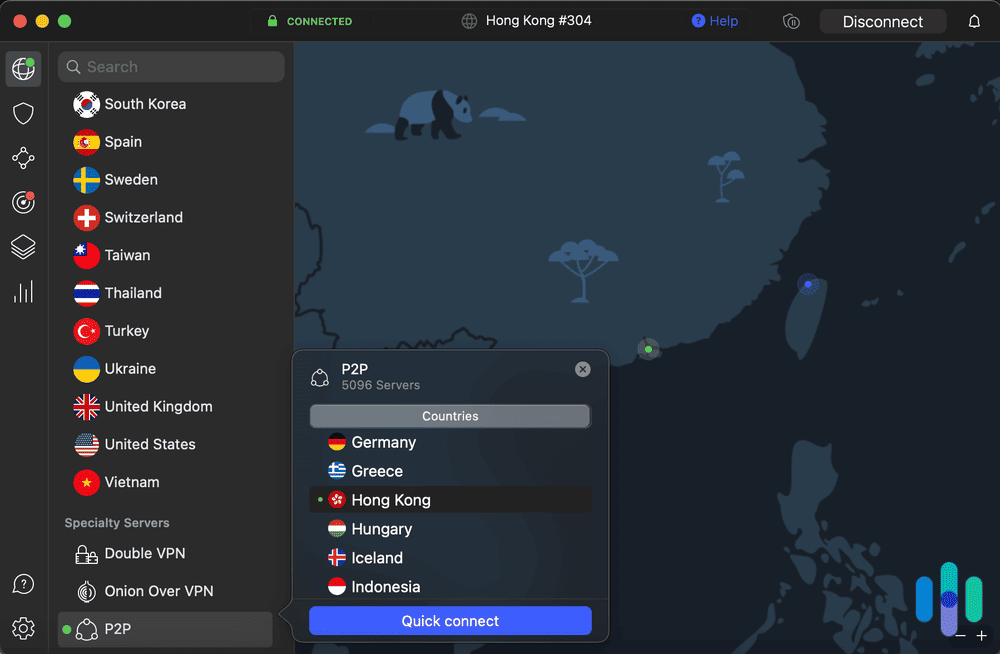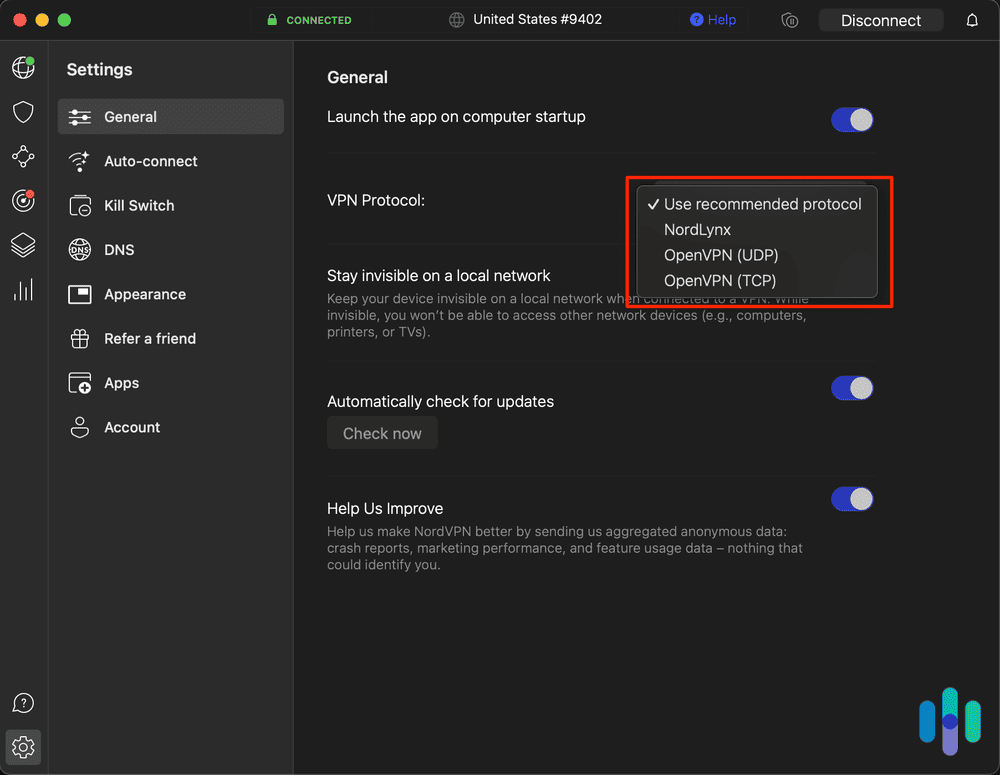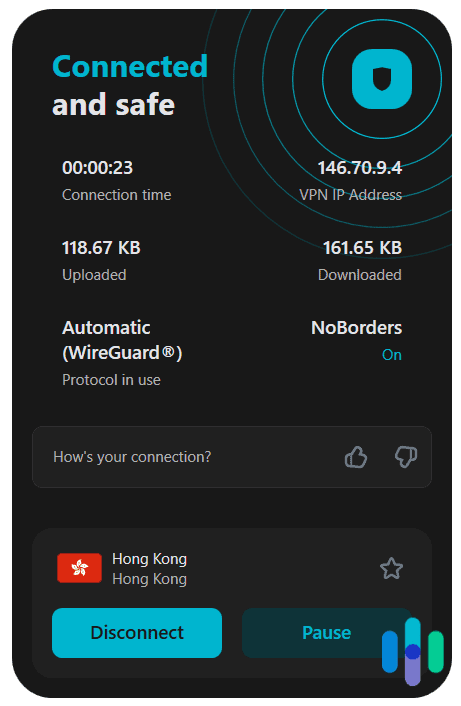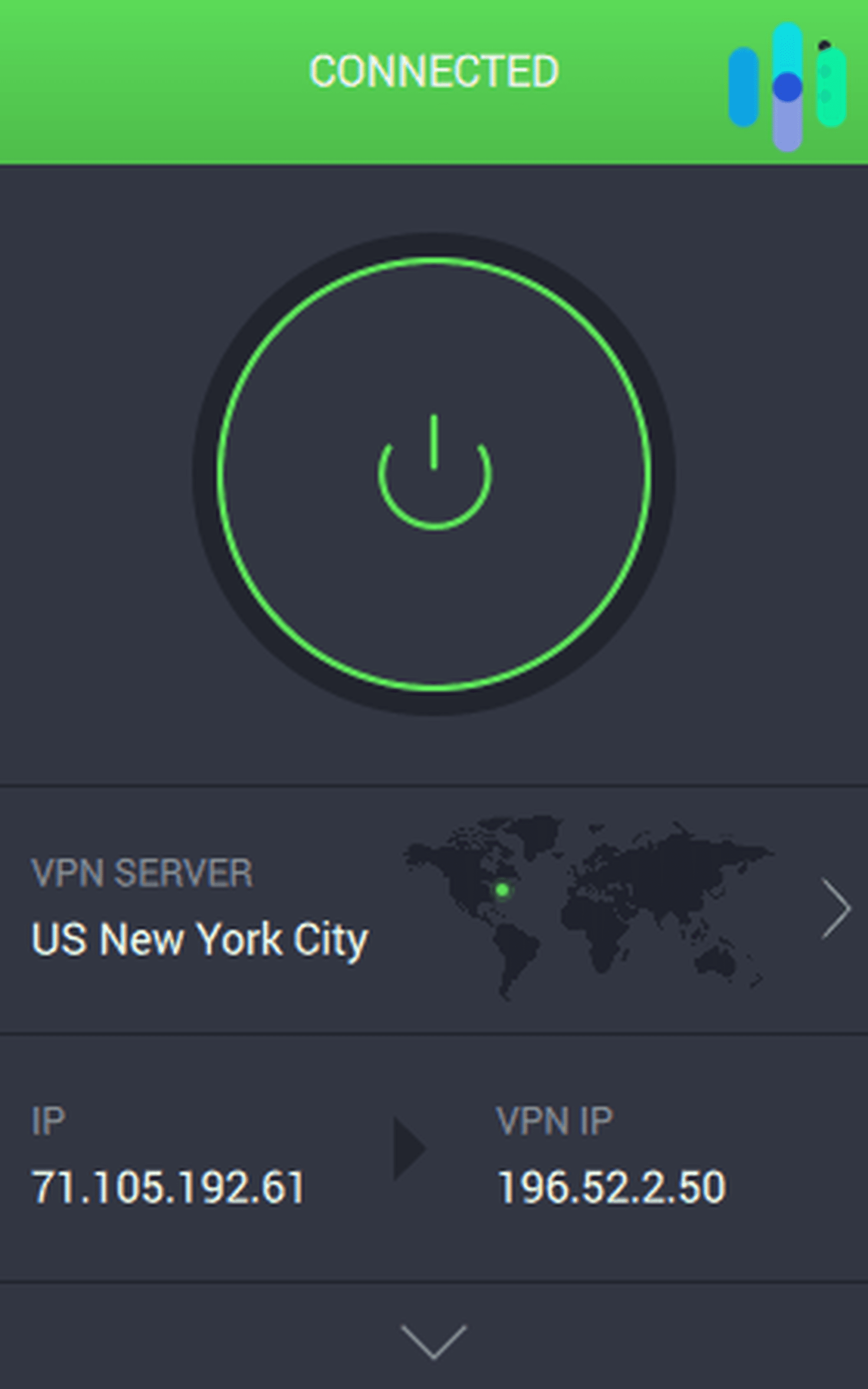The Best VPNs That Work in China: Our Top 3 Picks
Multi-hop technology double-encrypts your connection, and NordVPN's privacy policy is one of the best, which is why we recommend It.

- Multi-hop technology ensures your data is encrypted at least twice
- Kill switch shuts down all your activity any time you lose your VPN connection
- Air-tight privacy policy means NordVPN keeps no information about your online activities

- Unlimited simultaneous connections let you protect all of your devices at once
- With obfuscated servers the government doesn’t even know you’re using a VPN
- Regular audits by independent firms prove the company logs no personal data

- More than 15,000 servers around the globe guarantees a nearby connection
- Lightning fast speeds mean you can stream Chinese content with no buffering
- P2P-configured servers make torrenting fast and secure
China is known for a lot of things: its beautiful landscapes, its ancient culture, its exceptional cuisine, and its bustling modern cities.
Unfortunately, it’s also known for extreme government control and censorship. Even watching the latest version of Winnie the Pooh isn’t allowed in China. Nevermind watching your favorite episodes of a show that pushes the “moral edges” like Friends. And that’s just entertainment. China also censors information which can make it hard to work for a U.S. company from China or complete school assignments while abroad.
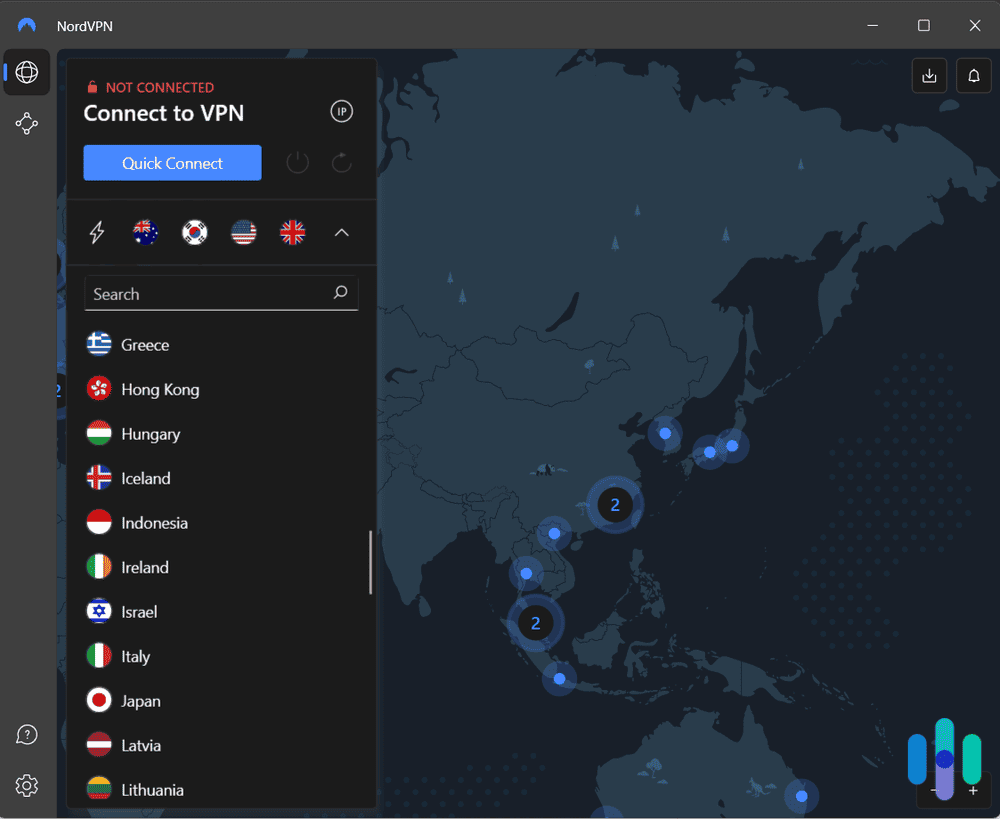
To browse the internet like you would in the states, you’ll need to use a virtual private network (VPN). But, you’ll need to dig a bit deeper than looking at a list of the top VPNs available to find one that works well in China. You’ll need a bit more than the basic features of a VPN to regain unrestricted access to the internet.
I’m going to tell you which three are my choices, but in order to understand this list, you’re going to need some context first. I promise we’ll move fast, and then we’ll dive right into my top picks.
What Is the Great Firewall?
The Great Firewall is the colloquial term used to describe the internet censorship tactics — both legal and technological — the Chinese government uses to monitor and limit internet access in the country. If you want to impress your friends on trivia night, you can bust this fact out: It’s officially called the Golden Shield Project.1
Most of the time, this works by straight-up IP blocking. All Chinese internet service providers block the IP addresses of blacklisted websites — anything from Netflix to the New York Times. They also use a method of DNS poisoning, which misconfigures DNS servers to return false IP addresses to users, making it impossible to access the desired location online.
» How to: Find your IP address
Keyword blocking is another tactic. The Chinese government can scan online content like search engines, forums, and messaging apps for forbidden words and phrases and block access to sites containing them. Much of this is automatic, but there is a large physical workforce tasked with policing the internet, as well.
So, with that context, you might be asking if you can even use a VPN in China at all.
Are VPNs Legal in China?
Let me preface this by saying I’m not a lawyer, much less an international one. I’m a VPN expert, so this is not actionable legal advice. In my research, though, I’ve found that using a VPN is legal in China, but there are a few caveats.2
>> Learn More: Best VPN for Hong Kong
You might have heard that VPN use is strictly forbidden in-country. That law really applies only to companies and corporations. Residents can use VPNs, but they need to be approved by the government and have back doors installed, which renders them almost pointless.
For visitors, VPN use is mostly fine, although if you’re not using a technologically advanced one, it’s not going to work. With that understanding, let’s take a look at some of the factors I used to come up with the list below.
What to Look for in a VPN for China
| Will it work in China? |
This might seem like a bit of a no-brainer, but you want to make sure the VPN you’re considering has been tested in-country and everything works. There’s a ton of information on the internet about this, including the article you’re currently reading. Good on you for doing your research. |
|---|---|
| Server obfuscation |
China works hard to block VPN traffic, and most of the time, it’s really good at sniffing it out. The best way to get around this is by selecting a VPN with obfuscated servers. I’ll get more into this later, but essentially, it means your provider is hiding the fact that you’re using a VPN. To the Chinese government, it’ll look like normal internet traffic. |
| Modern protocols |
The VPN protocol you’re using is another way you can be blocked by the Great Firewall. You’ll want to select a provider that uses proprietary protocols or at least WireGuard. |
| Large server list |
Like I said above, the Chinese government works tirelessly to restrict the internet. It’s not uncommon to find that the servers just stop working. Most of the time, changing over to a different server will do the trick, but you don’t want to run out of options. |
So, with those criteria in mind, let’s start talking about the best VPNs to use in China.
The Best VPNs for China
- NordVPN - The Most Secure VPN for China
- Surfshark - The Best Obfuscated VPN for China
- Private Internet Access VPN - The VPN for China With the Most Servers
VPN Specs: Side-by-Side Comparison
| System |
NordVPN

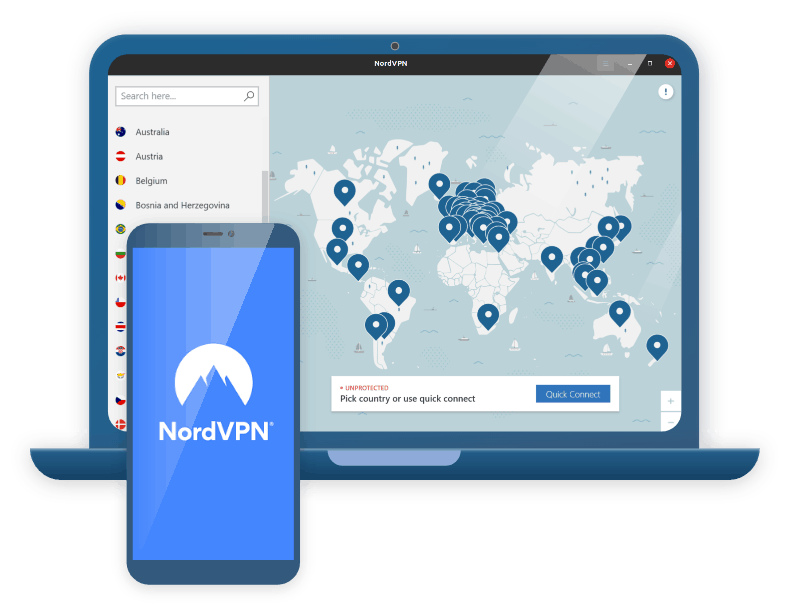
|
Surfshark


|
Private Internet Access VPN

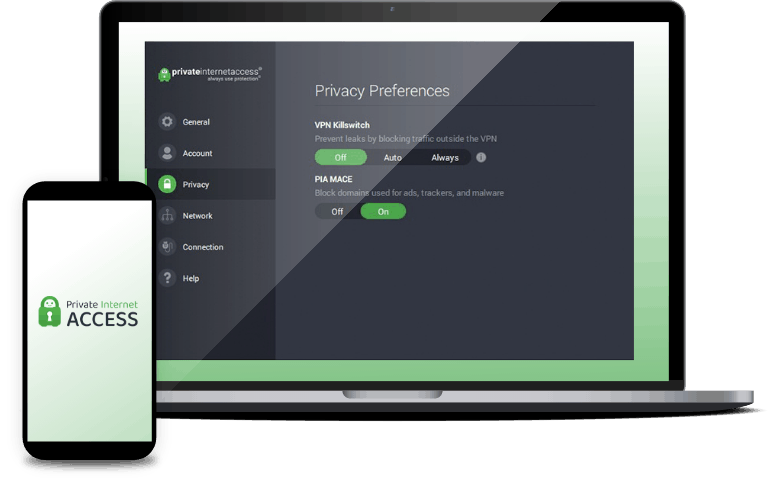
|
|---|---|---|---|
| Ranking | 1st | 2nd | 3rd |
| Ratings | 9.7/10 | 9.5/10 | 9.4/10 |
| Kill switch | Yes | Yes | Yes |
| Server obfuscation | Yes | Yes | No |
| Multi-hop | Yes | Yes | Yes (proxy only, no encryption) |
| Number of servers | 6,300 | 3,200 | 35,000 |
| Server locations | 111 | 100 | 91 |
| Best price | $3.69 per month | $2.39 per month | $1.98 per month |
| Read Review | NordVPN Review | Surfshark Review | Private Internet Access VPN Review |
Why They’re The Best: Summary of The Best VPNs in China
-
1. NordVPN - The Most Secure VPN for China
View Plans Links to NordVPNProduct Specs
Multihop Yes Camouflage Mode Yes Kill switch Yes Split Tunneling Yes Netflix Yes Torrenting Yes 
NordVPN in China
Out of the four criteria I listed in the chart above, NordVPN checks all the boxes. It’s known for working well in China, it offers server obfuscation, it has its own proprietary protocol, and its server list is more than respectable.
Connected to the Hong Kong P2P server with the NordVPN app First, let’s talk about obfuscation. NordVPN’s obfuscated server changes the way your data packets look so systems like the Great Firewall won’t recognize them as VPN traffic. For all the Chinese government knows, you’re using a standard connection.
This works in one of two ways. The first is that the server will use additional SSL/SSH packets so that all of the VPN metadata will be hidden — essentially encryption for your encryption. The second is that your data could be scrambled, hiding the metadata from the packet header. To the Great Firewall, it’s just regular HTTPS traffic filled with garbled information. Since it can’t decipher it, it will let it pass.
Next, let’s talk about NordLynx. This is a proprietary VPN protocol based on the super-popular open-source WireGuard protocol. It’s super fast and super secure, and it’s my go-to choice when I’m traveling or if I’m trying to access geo-restricted content through streaming platforms.
NordVPN’s different protocols and encryption methods >> Learn More: How To Remain Anonymous on the Internet
Finally, let’s talk about servers. NordVPN offers over 6,300 servers in 111 countries all over the world. While this number pales in comparison to Private Internet Access’ server fleet (35,000!), it’s still more than enough, in my opinion. Want to know more about the differences between these two providers? Take a look at my NordVPN vs Private Internet Access comparison.
In sum, NordVPN is one of my favorite VPN providers for a lot of reasons — mainly because it’s extremely well balanced. I used it most recently to stream a UFC fight for my friends, but it also does a great job of protecting me from dangers when I’m on the road, and connecting to the internet from cafes and hotel lobbies. If you’re traveling to China, it’s definitely my No. 1 recommendation.
What We Like
- DoubleVPN feature
- Specialty servers, including obfuscated servers
- 256-bit AES encryption
- Wide selection of servers in Asia (faster speeds if browsing from China)
What We Don’t Like
- May need advanced configuration to access in China
- DoubleVPN causes significant speed loss
- Limit of six devices per account
NordVPN’s Performance
Regardless of where you find yourself in the world, from Xinjiang Province to Zurich, using a VPN is going to slow you down a bit. The good news is that good VPNs, like Nord, aren’t going to slow you down so much that you’re going to want to pull your hair out. Check out the table below to see what I mean.
NordVPN Speed Test
Testing computer MacBook Pro Acer Aspire 5 Ping without VPN (in ms) 42 5 Ping with VPN (in ms) 46 160 Ping difference 10% 3100% Download speed without VPN (in Mbps) 54.86 23.49 Download speed with VPN (in Mbps) 41.37 21.7 Download speed difference 24% 8% Upload speed without VPN (in Mbps) 33.86 24 Upload speed with VPN (in Mbps) 27.21 7.91 Upload speed difference 20% 67% Now, as with any VPN speed test, I want to preface this by saying it’s a snapshot of how the VPN was performing at a specific moment in time. However, I will say this particular moment is pretty representative of how NordVPN performs overall. I’ve spent years working with Nord on and off, and I’ll say that anecdotally, it never really slows me down so much that it’s noticeable, but it does tend to perform a little better on Mac than it does on PC. If you want better speeds on a Mac than a PC, you might want to go with Surfshark, my second choice for VPNs in China. I cover all of their differences in my NordVPN vs Surfshark guide.
>> Learn More: Best VPNs for Mac
NordVPN’s Price
When it comes to NordVPN’s costs, everything is pretty much middle of the road. Private Internet Access — my No. 3 choice — is a little less expensive, and Surfshark — my No. 2 — is about on par, depending on the subscription duration you select. Here’s a breakdown:
NordVPN Prices
NordVPN plan Monthly cost 1-year plan 2-year plan Standard $12.99 $4.59 per month $3.69 per month Plus $13.99 $5.49 per month $4.69 per month Ultimate $15.99 $7.49 per month $6.69 per month One thing to keep in mind: If you’re looking for a VPN service only, you don’t really need to go with the Plus or Complete packages. They offer some interesting add-ons, but nothing you’ll need to access the internet in China.
-
2. Surfshark - The Best Obfuscated VPN for China
View Plans Links to SurfsharkProduct Specs
Multi-hop Yes Camouflage Mode Yes Kill switch Yes Split Tunneling Yes Netflix Yes Torrenting Yes 
Surfshark for China
The reason why Surfshark shows up on this list is twofold: Camouflage mode and NoBorders mode.
Surfshark connected to Hong Kong with NoBorders Mode Surfshark’s Camouflage mode is what they call server obfuscation. Similar to NordVPN, while connecting through obfuscated servers, you’ll make it exceedingly difficult for the Chinese government to determine if you’re connecting through a VPN. I also like that Surfshark’s Camouflage mode turns on automatically when you use the OpenVPN (UDP or TCP) protocols. I’ve found that this isn’t the fastest way to use Surfshark — that would be with WireGuard — but it does significantly increase your chances of getting around the Great Firewall.
» Further reading: Best VPN in Japan
NoBorders is also a great feature offered by Surfshark — and a unique one too. If the provider detects that an internet service provider or government entity is trying to restrict your network access, it will automatically activate NoBorders mode, which will give you a list of servers — and connect you to the closest one automatically — that will work best under your specific conditions.
I actually used NoBorders quite a bit in college. One of my friends went to a very strict private school that really locked down what websites you could access — much like China, coincidentally. Once I showed him Surfshark, we were able to get around the firewall and watch whatever silly YouTube video was all the rage back then.
What We Like
- Camouflage mode and servers optimized for obfuscation
- NoBorders mode
- OpenVPN protocol works in China
- Dynamic MultiHop
What We Don’t Like
- May lag when streaming
- No specialized servers for P2P file sharing
- Based in the Netherlands (14 Eyes country)
- Camouflage mode and NoBorders mode not always foolproof
Surfshark’s Performance
When it comes to speed, Surfshark performs about as well as NordVPN, and there isn’t much of a difference between PC and Mac, as demonstrated by the speed tests below:
Surfshark Speed Test
Testing computer MacBook Pro Acer Aspire 5 Ping without VPN 54 ms 7 ms Ping with VPN 53 ms 199 ms Ping difference 2% 2742% Download speed without VPN 16.21 Mbps 23.69 Mbps Download speed with VPN 11.87 Mbps 19.61 Mbps Download speed difference 31% 17% Upload speed without VPN 22.01 Mbps 24.09 Mbps Upload speed with VPN 24 Mbps 10.58 Mbps Upload speed difference 9% 56% In my experience working with Surfshark, it works just a little bit better on Apple products. That isn’t to say I wouldn’t recommend it to PC users, as it’s my No. 2 choice on my list of the best VPNs for Windows.
Surfshark’s Price
Similar to NordVPN, Surfshark divides its services up into three subscription packages across three terms. I have more information on this in my guide to Surfshark’s costs, but here’s a quick breakdown:
Surfshark Prices
Surfshark plan Monthly cost 1-year plan 2-year plan Surfshark Starter $15.45 $3.22 per month $2.39 per month Surfshark One $15.95 $3.77 per month $3.06 per month Surfshark One+ $17.95 $5.99 per month $4.69 per month As you can see, Surfshark’s month-to-month costs are a little higher than NordVPN’s, but I’d recommend opting for a one- or two-year plan anyway. The savings are significant, and if you decide you don’t like the service, or if it doesn’t work for your purposes, you can always take advantage of Surfshark’s 30-day return policy, which is one of the best return policies I’ve come across in the industry. One thing I like about Surfshark over NordVPN in terms of pricing is that Surfshark keeps lowering their prices for longer subscriptions instead of raising them.
Also, just like with NordVPN, if you’re only subscribing for access to Surfshark’s VPN, you can go with the Starter plan. The higher tiers add extra protections like antivirus software and data removal services.
-
3. Private Internet Access VPN - The VPN for China With the Most Servers
View Plans Links to Private Internet Access VPNProduct Specs
Multihop Yes Camouflage Mode No Kill switch Yes Split Tunneling Yes Netflix Yes Torrenting Yes 
Private Internet Access for China
Private Internet Access, or PIA for short, is notable for a lot of reasons. First, it’s great for newbies and experienced VPN users alike. The simple user interface is accessible, but the level of customizability you can get into is almost unlimited. I really like that.
Connected to Private Internet Access Second, its server list is absolutely massive. Remember how NordVPN has about 5,000 servers? PIA has seven times that. At 35,000 servers strong, PIA is the largest VPN network available to everyday consumers.
That said, one thing that’s crucially missing is server obfuscation. That means that your VPN traffic is going to be sitting out there, just waiting for the Great Firewall to boot you off the internet in China.
So, why did I include them on this list? Because of firsthand accounts of actual Chinese residents using PIA successfully. The common theme? Use the WireGuard protocol. It’s better able to sneak through undetected. That said, most of the accounts I read said that you’re going to have to change servers every couple of days, but with 35,000 to choose from, that shouldn’t be too big of a deal.
And, if you’re really ambitious, you can set PIA up manually on your device. This can help you better evade the censors, but it does take some technical know-how. Thankfully, PIA has a pretty strong support portal on its website.
>> Learn More: Best VPNs for Linux
What We Like
- Private Internet Access apps provide customization options
- Unlimited simultaneous connections
- Affordable
- Has servers in China
What We Don’t Like
- Lacks obfuscation
- SOCKS5 proxy used for multi-hop
- U.S.-based company (may share data with the U.S. government)
- PIA website blocked in China
PIAs Performance
Unlike the other two VPNs on my list, out of the box, PIA tends to run a little better on Windows than it does Mac. That said, there’s a lot of tweaking you can do to PIA to fine-tune things and really make it sing no matter what machine you’re working with. Here’s the data from my most recent speed test for context:
Download Speed on Mac
Without VPN 37.05 Mbps With VPN 12.93 Mbps Download Speed on Windows
Without VPN 72.48 Mbps With VPN 61.67 Mbps Upload Speed on Mac
Without VPN 25.9 Mbps With VPN 18.12 Mbps Upload Speed on Windows
Without VPN 41.37 Mbps With VPN 39.13 Mbps Again, I want to reiterate that depending on your hardware, your location, and even the time of day, your connection speeds are going to vary pretty significantly. While your results might be vastly different from what’s above, I do feel confident in saying that PIA is plenty fast. And, if you’re running into connectivity issues, do what I do: Switch the server or switch the protocol. Most of the time, that takes care of your issue.
PIA’s Prices
Again, unlike Nord and Surfshark, PIA takes a pretty simple approach to their pricing. There aren’t any subscription tiers here, just different subscription durations. Eagle-eyed readers will also notice that if you purchase the three-year plan, you’re going to save significantly over the other two VPNs on this list. I have more on this in my guide to Private Internet Access pricing, but PIA is one of the most affordable VPNs out there.
PIA’s Costs
PIA subscription term 1 month 1 year 3 years Monthly cost $11.95 $3.33 per month $1.98 per month Total cost $11.95 $39.95 $79.00 Before we go, here’s one last hint if you’re looking to save. There are a lot of VPNs that offer free trials. I can’t speak to their efficacy in China, but if you’re stateside, make sure to give them a look.
Why Do You Need a VPN in China?
In China, the internet is controlled and regulated by the government. The Great Firewall controls both inbound and outbound traffic, and users are blocked from accessing most popular websites and social media networks. Certain keywords are filtered from search engines. China is extremely controlling in this sense, and the internet you can access there is a whole lot different from the internet you can connect to in the rest of the world.
» Learn about: How to unblock websites
That said, a powerful VPN will be able to get around the firewall and provide you access to the free and open internet, but not without jumping through a few hoops. You need to make sure you’re using a technologically advanced VPN with server obfuscation, and you really need to make sure you’re not doing anything that will raise suspicions, like posting content that could be viewed as inflammatory or accessing materials that could be seen as countercultural.
» Do you know: Best VPN for South Korea
Will I Get Arrested for Using a VPN If I Visit China?
Again, I am not a lawyer. I can’t stress that enough. However, the big, scary “VPNs are illegal in China” warning is a little unfounded and mostly applies to local businesses and corporations. Occasionally, authorities will ask to see a visitor’s phone, and that visitor will be asked to delete a VPN app they have on it. But, unless you’re doing something that will draw the attention of the Chinese government, you should be fine. That said, there are some countries that ban VPN use outright, so make sure you do your research if you’re traveling internationally.
>> Check Out: Best VPNs for Travel
Overall, just use your head. Be aware of where you are and what the culture is. If you’re looking to use your VPN to stream Netflix from back home, you’re probably going to be OK. If you’re visiting revolutionary websites or researching what happened in Tiananmen Square, you might get a knock at the door. Just be smart.
Our Methodology: How We Developed Our List of the Best VPNs to Use in China
We want to be very clear on how we selected the VPNs for this list, so let’s go through each category:
Obfuscation
One of the primary determining factors for if a VPN showed up on our list is the provider’s ability to obfuscate its traffic. This can be accomplished in a number of ways, but ultimately, we’re looking for VPNs that hide the fact they’re VPNs. China’s censors are always changing their tactics, and one of the best ways to stay ahead of this evolution is to deploy a VPN with some method of server obfuscation.
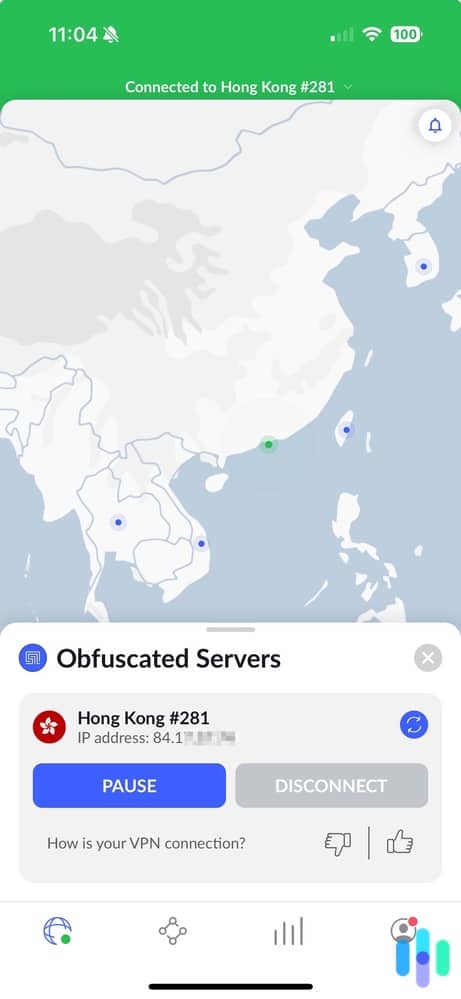
Server List
The Great Firewall is like a living organism. It’s always growing and adapting. As such, the VPN server you were using with no problem last week suddenly might be banned tomorrow. For this list, we selected VPNs with large enough server fleets to handle the need to constantly try out new connections. Anything under 2,000 didn’t make the cut. We also focused on VPNs with a heavy presence in Asian countries, or China itself, to keep users’ speeds high.
>> Also Read: Top VPNs for Singapore
Performance
All VPNs will slow you down. That’s just a fact. That said, we always select VPNs that are advanced enough to ensure these slowdowns are minimal. We test the VPN’s upload speed, download speed, and amount of latency using tools from Ookla. In an ideal world, a VPN won’t slow down our speeds by more than 40 percent in any of these categories.
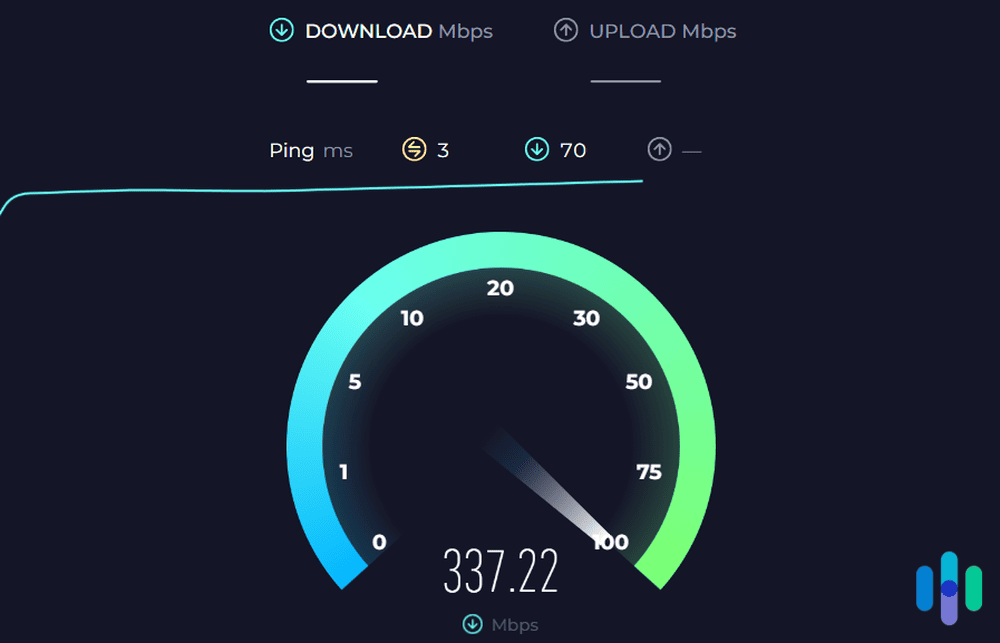
Pricing
At the end of the day, cash is king no matter where you are. This is why we look for affordable VPNs that cost no more than $8 to $15 when purchased monthly. For longer subscription terms, we didn’t include any VPN with a cost above $5 per month. We also look for VPNs with free trial periods and generous return policies so you can test them out for yourself. While a totally free VPN might sound ideal, they usually come with limits on the number of devices you can use or the amount of data you can use in a day. Very few of these, if any, work in China anyway.
>> Learn More: VPN Deals and Discounts
FAQs on VPNs That Work in China
Have some more questions about using a VPN in China? Don’t worry, we’ve got the answers to some of the most common ones below.
-
Why are some VPN websites blocked in China?
China has strict regulations as to which VPNs are allowed to operate in the country. However, these regulations make the “legal” VPNs unsecure, as they give the government backdoor access to VPN systems. The VPNs that don’t follow China’s VPN guidelines are more secure, but because they are technically illegal, their websites are banned in the country.
-
What does the Great Firewall of China monitor?
The Great Firewall monitors all internet traffic originating from IP addresses in China. The official purpose is to monitor and restrict the internet access of subvertors, terrorists, and activists speaking against the Chinese government.
-
What sites are blocked in China?
A lot of websites are blocked in China, including Western social media platforms, foreign news agencies and publications, and even search engines. China has domestic versions of such sites, but these are often regulated and controlled by the government.
-
Besides China, are there other countries that restrict VPN use?
Yes. In fact, China isn’t the most restrictive country in terms of VPN use. There are countries that completely ban VPNs, such as Iraq, Belarus, and North Korea. The use of VPNs is also heavily regulated in Russia, the UAE, Iran, and Turkey, just to name a few examples.
-
Do Free VPNs work in China?
China has an extremely sophisticated censorship network designed to keep strict control over the information available to its citizens via the internet. As such, most “free” VPNs you’ll find online aren’t going to have the advanced features necessary to access the internet there.
TechTarget. (2022). Great Firewall of China.
techtarget.com/whatis/definition/Great-Firewall-of-ChinaGeorgetown University. (2017). The Door Is Closed, but Not Locked: China's VPN Policy.
repository.library.georgetown.edu/handle/10822/1043811

